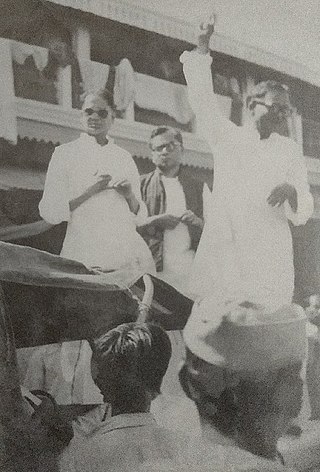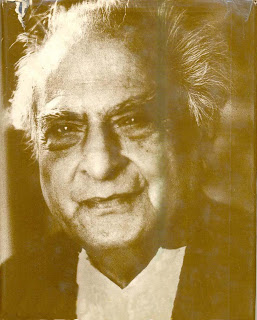
Jayaprakash Narayan Srivastava,also known as JP and Lok Nayak,was an Indian politician,theorist and independence activist. He is mainly remembered for leading the mid-1970s opposition against Prime Minister Indira Gandhi and calling for her overthrow in a "total revolution". In 1999,Narayan was posthumously awarded the Bharat Ratna,India's highest civilian award,in recognition of his social service. His other awards include the Magsaysay award for public service in 1965.

Rajendra Prasad was an Indian politician,lawyer,journalist and scholar who served as the first president of India from 1952 to 1962. He joined the Indian National Congress during the Indian independence movement and became a major leader from the region of Bihar. A supporter of Mahatma Gandhi,Prasad was imprisoned by British authorities during the Salt Satyagraha of 1930 and the Quit India movement of 1942. After the constituent assembly 1946 elections,Prasad served as 1st Minister of Food and Agriculture in the central government from 1947 to 1948. Upon independence in 1947,Prasad was elected as President of the Constituent Assembly of India,which prepared the Constitution of India and which served as its provisional Parliament.

The Congress Socialist Party (CSP) was a socialist caucus within the Indian National Congress. It was founded in 1934 by Congress members who rejected what they saw as the anti-rational mysticism of Gandhi as well as the sectarian attitude of the Communist Party of India towards the Congress. Influenced by Fabianism as well as Marxism-Leninism,the CSP included advocates of armed struggle or sabotage (such as Yusuf Meherally,Jayaprakash Narayan,and Basawon Singh as well as those who insisted upon Ahimsa or Nonviolent resistance. The CSP advocated decentralized socialism in which co-operatives,trade unions,independent farmers,and local authorities would hold a substantial share of the economic power.

Gandhi Maidan is a historic ground in Patna,near the banks of the Ganges River,in Bihar,India. The Golghar falls to its west. During the period of 1824–1833,under British rule,it was used as a golf course and horse racing track and was called Patna Lawns. It is spread across 60 acres of land. It has a great political significance as well.

Parmeshwar Narayan Haksar was an Indian bureaucrat and diplomat,best known for his two-year stint as Prime Minister Indira Gandhi's principal secretary (1971–73). In that role,Haksar was the chief strategist and policy adviser behind Gandhi's early years and her establishment of strong authority in the 1970s. After this he was appointed deputy chairman of the Planning Commission and then the first-ever chancellor of New Delhi's Jawaharlal Nehru University.
Loknayak is a 2004 biographical film based on the life of Jayaprakash Narayan. It was directed by Prakash Jha. Chetan Pandit played the role of Jayaprakash Narayan and Tisca Chopra played role of Prabhavati Devi,wife of JP Narayan.
Prabhavati Devi Narayan was an Indian independence activist from the present-day state of Bihar,and wife of compatriot independence and social activist,Jayprakash Narayan.

Jivatram Bhagwandas Kripalani,popularly known as Acharya Kripalani,was an Indian politician,noted particularly for holding the presidency of the Indian National Congress during the transfer of power in 1947 and the husband of Sucheta Kripalani. Kripalani was an environmentalist,mystic and independence activist who was long a Gandhian socialist. He himself founded the Kisan Mazdoor Praja Party in 1951,that merged with the Socialist Party (India) to form the Praja Socialist Party the following year. Later,he joined the economically right wing Swatantra Party later in life.

Basawon Singh or Basawan Singh,also known as Basawon Sinha,was an Indian independence activist and a campaigner for the rights of the underprivileged,and industrial and agricultural workers.
The Bihar movement,also known as the JP movement,was a political movement initiated by students in the Indian state of Bihar against misrule and corruption in the state government,in 1974. It was led by the veteran Gandhian socialist Jayaprakash Narayan,popularly known as JP. The movement later turned against Indian Prime Minister Indira Gandhi's government in the central government. It was also referred to as Sampoorna Kranti.

Yogendra Shukla was an Indian nationalist and freedom fighter,notable for his contributions in the state of Bihar. He was incarcerated in the Cellular Jail,also known as Kala Pani,and was a founding member of the Hindustan Socialist Republican Association (HSRA). Shukla,in collaboration with Basawon Singh (Sinha),was also instrumental in establishing the Congress Socialist Party in Bihar.

Anugrah Narayan Sinha,known as Bihar Vibhuti,was an Indian nationalist politician,participant in Champaran Satyagraha,Gandhian &one of the architects of modern Bihar,who was the first Deputy Chief Minister and the Finance Minister of the Indian state of Bihar (1946–1957). He was also a Member of the Constituent Assembly of India,which was elected to write the Constitution of India and served in its first Parliament as an independent nation. He also held a range of portfolios including Labour,Local Self Government,Public Works,Supply &Price Control,Health and Agriculture. A.N. Sinha,affectionately called Anugrah Babu,was a close associate of Mahatma Gandhi during the freedom movement and worked with Bihar Kesari Sri Krishna Sinha to lead the Gandhian movement in Bihar. One of the leading nationalists in the Indian independence movement from Bihar after Dr Rajendra Prasad,he was elected as the Congress Party deputy leader in the state assembly to assume office as the first Deputy Chief Minister cum Finance Minister of independent Bihar,and re-elected when the Congress Party won Bihar's first general election with a massive mandate in 1952.

Dilli Raman Regmi was a scholar,iconic political figure and academician of Nepal. He dedicated his life to research,study,writing and politics. He was one of the driving forces behind creating Nepali Rastriya Congress party in 1946.
Jayant Prasad is a former Indian civil servant of the Indian Foreign Service cadre who served as the Director General of the Delhi-based Institute for Defence Studies and Analyses,a think-tank affiliated with the Indian Ministry of Defence between September 2015 and September 2018.

Matrika Prasad Koirala was the Prime Minister of Nepal for two separate terms from 16 November 1951 to 14 August 1952 and again from 15 June 1953 to 11 April 1955.
Uma Shankar Bajpai was an Indian diplomat and a veteran journalist. He was also the director of India International Centre.
Sadaqat Ashram is located in Patna,Bihar,beside the main road of Digha area,on the banks of the River Ganges,almost seven kilometres from the airport. This was one of the residences of Dr. Rajendra Prasad,the first President of India,who lived there after retirement and spent the last days of his life there.
Bhadrakali Mishra was a Nepali politician. In a political career lasting more than 50 years,several of which he spent in exile,he held numerous ministerial portfolios and was also the Chairman of King Birendra's Raj Parishad Standing Committee after the establishment of multi-party democracy in 1990.
Shanti Kumar Morarjee was a noted industrialist,businessman and close associate of Mahatma Gandhi.
The History of Indian foreign policy refers to the foreign relations of modern India post-independence,that is the Dominion of India (from 1947 to 1950) and the Republic of India (from 1950 onwards).










